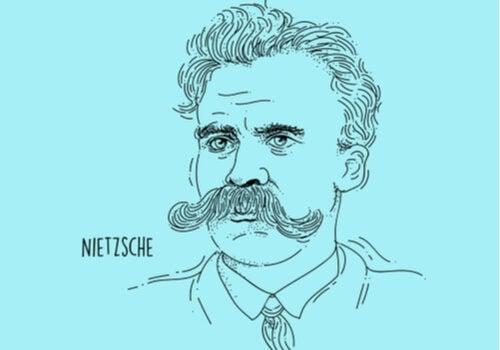Nihilism is one of the most important philosophical currents in the 20th century. Currently, there are traces of it in our societies. To define it, we must explore its meaning, history, and different forms. Therefore, the questioning nature of this trend is useful for having a critical look at life.
Discover in this article what this form of existentialism consists of, the different types or classifications, and its most important authors.
What is nihilism?
The Encyclopedia of Philosophy highlights that the term nihilism comes from the Latin nihil, which means nothing and, therefore, refers to that which doesn’t exist. It’s a psychological current and a philosophical attitude toward life. It supports the belief that the values on which society rests lack foundations and meaning.
Added to this, it professes an extreme pessimism and a radical skepticism that condemns existence. That is, it suggests that nothing makes sense, even life itself.
A true nihilistic attitude doesn’t believe in anything or anyone; therefore, they shouldn’t profess loyalties or fanaticism. They’re guided by a destructive impulse, the product of their own belief. If nothing makes sense, then everything must be destroyed. Nothing we do or believe has meaning. It all comes down to nothing.
Toward the end of the 20th century, the effects of nihilism generated a feeling of existential fear among the population. It consisted of blaming this philosophical current for causing an attitude of indifference toward life. Such an attitude caused emotions of anguish and, therefore, discomfort in people.
We invite you to read: How to Overcome an Existential Crisis
Nihilism was founded by a novelist
According to Cartaphilus, a magazine from the University of Murcia, the Russian novelist Iván Turguéniev is credited with the emergence of the term in his novel Fathers and Sons (1862). In it, the character of Bazarov embodies the attitude and ideas of nihilism.
There’s a confrontation between two positions that generates a generational conflict. On the one hand, there are the parents, who want to preserve traditional ideals; on the other, the children, who are disenchanted with the old ideals. They have a skeptical, scientific, and utilitarian worldview.
It’s for this reason that the children and the new generations are considered to be rebels. They don’t respect or abide by any authority and instead seek to replace old beliefs and ideals with new principles, founded on science and utility.
What are the types of nihilism?
We can differentiate different types of nihilism according to those aspects of reality that they deny. In the following sections, we’ll explain in an introductory way what each class consists of.
Skeptical
We can consider skepticism as a nihilistic philosophical current. Skeptics deny the possibility of establishing any certainty; that is, we have no guarantee in this life. Everything is uncertain. At the same time, skeptical nihilists denounce traditional beliefs as unjustifiable because they consider that they limit and corrupt human beings.
Epistemological
This type of nihilism sustains extreme skepticism, as it denies any possibility of constituting knowledge and truth. We can know another, and therefore, nothing is true.
Political
According to this type of nihilism, achieving a better future requires the destruction of all political, social, and religious existence. In other words, all the social institutions that we know must disappear, as they lack meaning and foundation.
Ethical
Ethical nihilism rejects the possibility that human beings possess morality or absolute values. There’s nothing beyond our reality, and there’s no other world to cling to. Therefore, values are produced by social and emotional pressures.
Existential
In this type of nihilism, life has no value or meaning How many times have you thought or expressed out loud that life is meaningless? It’s an existential nihilistic attitude. Consequently, if life has no meaning, neither does the world we inhabit.
Russian nihilism
As we mentioned above, the term appeared for the first time in Russian literature during tsarist Russia in the 19th century. It represented a form of reaction against the State and its religious, metaphysical, and social ideals.
In this context, nihilism was the expression of a fundamental crisis due to the rejection of the prevailing government. The characteristics of Russian nihilism are the following:
- The rejection of traditions
- The transformation of society
- Belief in science and philosophy
- Action in accordance with the principle of utility
- In favor of the destruction of the semi-feudal society of the 19th century
Russian nihilists also had a scientific vision within their philosophical conception. They held that science is true knowledge, and its function is to explain, predict, and change the world and society. For this reason, their ideals were founded on a combination of scientific knowledge and philosophy.
Who were the nihilist philosophers?
The nihilistic thought of the most outstanding philosophers in the current contains the answer to the question about the concept of this attitude. Below, we’ll expose what three of the most important representatives said about it.
Friedrich Nietzsche
This German philosopher, born in 1844, was associated with the nihilist current. He maintained that this would destroy all morality, religion, and metaphysical convictions that supported the society of his time. The consequence of this was an acceleration of the greatest human crisis in history, the product of the disintegration of traditional morality.
According to Gil (2011), Nietzsche read Iván Turguéniev’s novel and, based on this reading, formulated and philosophically articulated the concept of nihilism.
Nietzsche’s nihilistic theory goes through three moments. The first of them has to do with the emergence of Christian morality. She protects the values of love for others, disinterest in material things, and the protection of the weakest. In addition, he defends a higher life beyond the one we live.
The second moment is known as the “death of God.” In this, the values of Christian morality lose their meaning and importance, generating a lack of goals and answers to the why of life and the world.
The third and last moment is known as reassessment: A new man emerges who establishes a new meaning, the one that has been lost. It’s a constructive moment that represents the opportunity to carry out a social and moral transformation.
Jean Paul Sartre
According to the philosophical magazine of the University of Barcelona, Sartre maintained that man, after the death of God, has an infinite existence of possibilities. That is, the individual has the possibility of creating himself without any restriction.
We can ask you what this has to do with nihilism. Precisely, this infinite freedom that the human being possesses is positive, but it’s also negative. The individual is born in an infinite world, without a certain duty to fulfill. So, Sartrean nihilism is found in the loss of meaning and sense of freedom.
The autonomy that human beings have is an opportunity for them to constantly invent and reinvent themselves. The power of decision rests exclusively within the human being.
Heidegger
This German philosopher postulated his ontology or question about being from a nihilistic vision. The journal Pensamiento considers that, for Martin Heidegger, nothingness is what allows us to capture the meaning of being. From his perspective, to exist is to be sustained within nothing.
In this regard, the meaning of being is manifested from nothingness that reveals to the human being their mortal condition.
This generates in the individual a feeling of anguish that Heidegger understands as a radical state of mind. Human beings, when experiencing this feeling, find themselves face to face with nothingness or death. Hence, Heideggerian nihilism.
Discover: Understanding Heidegger
In conclusion
Nihilism is a philosophical current that disputes the existence and values that govern our societies. Carrying out this questioning exercise serves to reflect on better alternatives or to improve things that already exist.
Perhaps at some point, you reduced everything to nothing and thought in a nihilistic way, even without knowing that this way of thinking belongs to a specific current.
The post What is Nihilism? A Brief Introduction appeared first on Exploring your mind.


















Comments